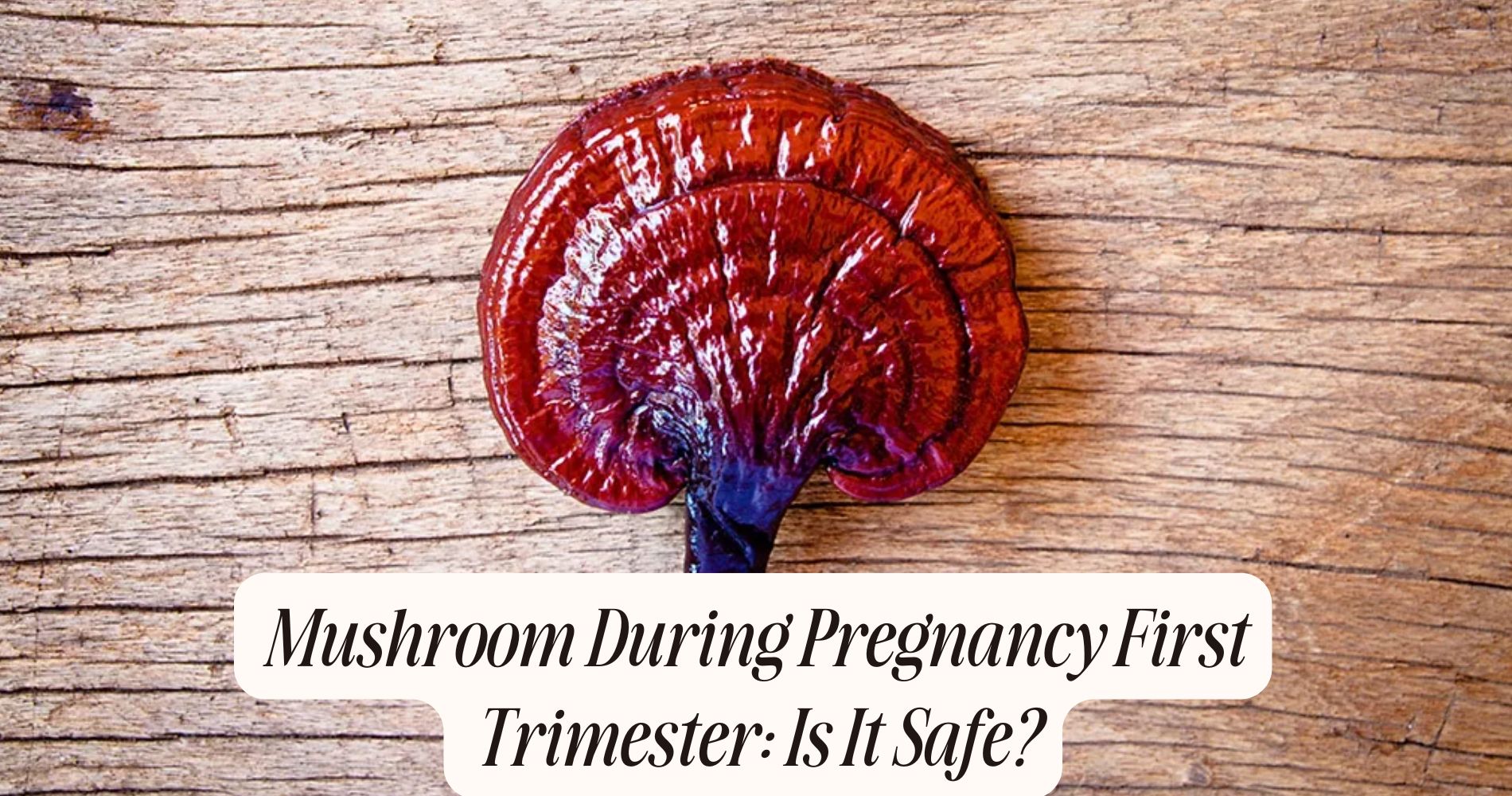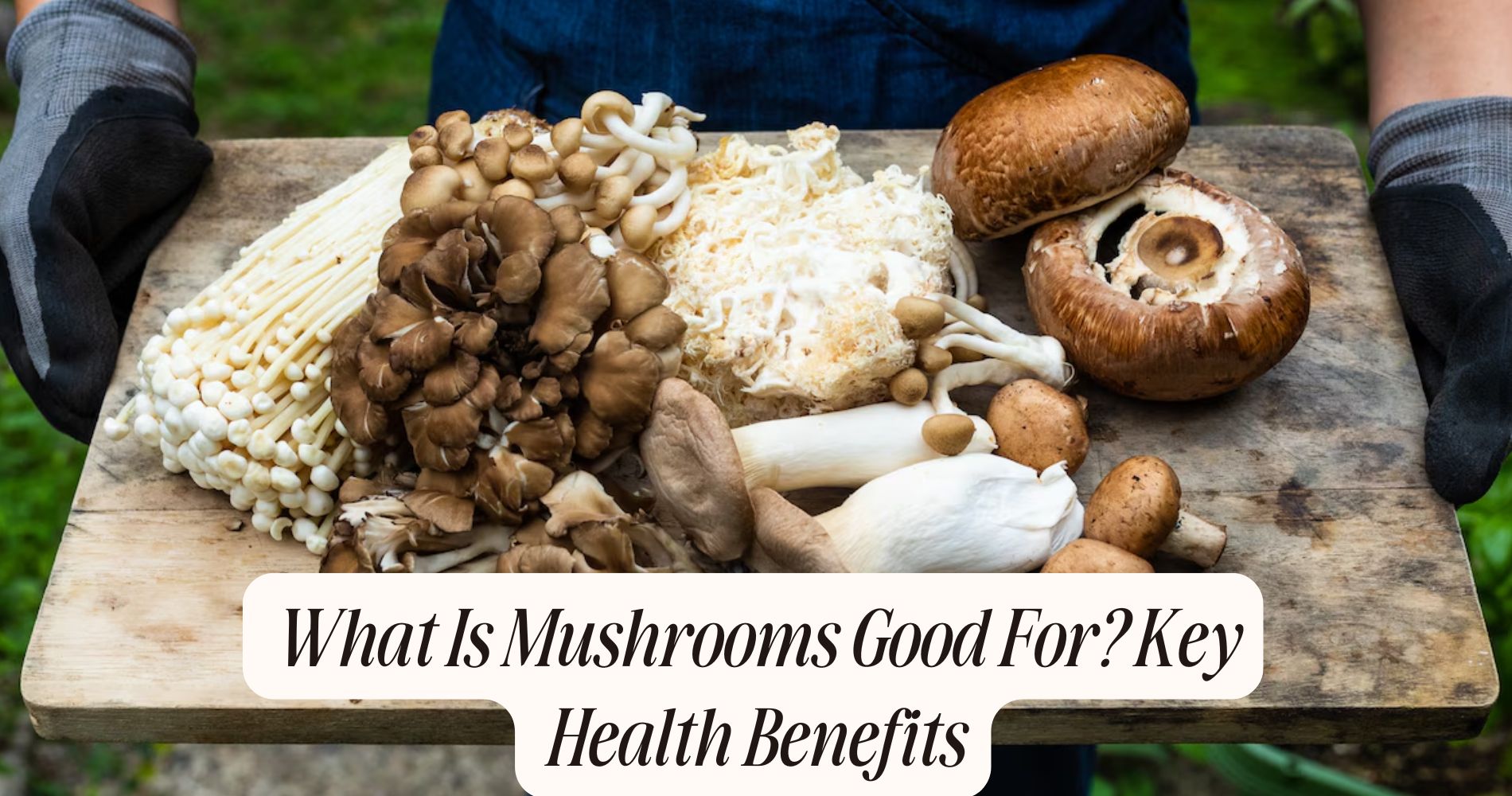
Mushroom During Pregnancy First Trimester: Is It Safe?
Mushrooms can be safe and nutritious during your first trimester, but you need to choose and prepare them carefully. They're rich in vitamins D and B, as well as antioxidants, which support both your health and your baby's development. Always opt for well-cooked varieties, like shiitake or portobello, and avoid raw or undercooked mushrooms. Be mindful of potential allergies, as pregnancy can heighten sensitivity. It's essential to know which types are safe and consider organic options to reduce chemical exposure. By understanding these factors, you can enjoy mushrooms as part of a balanced diet—discover more options and tips ahead.
Nutritional Benefits of Mushrooms
Mushrooms pack a punch when it comes to nutritional benefits, making them a great addition to your diet during pregnancy. They're low in calories yet rich in essential nutrients, including vitamins D, B, and minerals like selenium and potassium. These nutrients support both your health and your baby's development.
When you explore the nutritional comparisons of mushrooms, you'll find they're an excellent source of antioxidants, which can help combat oxidative stress during pregnancy. Plus, their fiber content aids digestion, a common concern for expectant mothers.

For effective cooking tips, consider sautéing or roasting mushrooms to enhance their flavor and nutrient profile. Toss them into stir-fries, omelets, or salads to maximize their benefits.
Remember to always wash them thoroughly and cook them properly to guarantee safety.
You might also want to experiment with various types of mushrooms, as each offers unique flavors and nutritional perks. By incorporating mushrooms into your meals, you'll not only enjoy delicious dishes but also boost your nutrient intake, making your pregnancy journey healthier and more enjoyable.
Common Types of Edible Mushrooms
When it comes to edible varieties, there are several popular types of mushrooms that you can easily incorporate into your meals. One of the most cherished types is the shiitake variety. These mushrooms not only add a rich, savory flavor to dishes, but they're also packed with nutrients, including vitamins B and D. Their unique taste can elevate stir-fries, soups, and even pasta dishes.
Another fantastic option is the portobello mushroom. Known for its meaty texture, it's a great substitute for meat in many recipes. The portobello benefits include being low in calories while offering a good source of fiber and antioxidants. You can grill, roast, or stuff them with your favorite fillings, making them a versatile choice for any meal.
Don't overlook button mushrooms, either; they're mild in flavor and work well in salads, omelets, and sauces.
Each type of mushroom brings something special to your plate, making it easy to enjoy their flavors and health benefits. As you explore these edible varieties, you'll find plenty of ways to include them in your meals for added nutrition and taste.
Potential Risks of Mushroom Consumption
When you're pregnant, being cautious about mushroom consumption is essential.
Some mushrooms can be toxic, and you may also face allergy risks that could affect your health and your baby's.
It's important to know which varieties to avoid and what symptoms to watch for.
Toxic Mushroom Varieties
Several mushroom varieties pose significant risks, especially during pregnancy. While many mushrooms are safe and nutritious, some can be incredibly harmful. You need to be cautious about edible identification to avoid poisonous species that can lead to severe health issues.
One of the most notorious poisonous mushrooms is the Amanita phalloides, commonly known as the death cap. Just a small amount can cause liver and kidney failure, which is particularly dangerous for pregnant women. Other harmful varieties, like the Destroying Angel, also belong to the Amanita family and carry similar risks.

It's important to remember that not all mushrooms are easily distinguishable. Some edible species have toxic look-alikes, making it vital to consult with an expert or use reliable resources for identification. If you're foraging, never consume a mushroom unless you're 100% sure it's safe.
During pregnancy, your immune system is already under stress, so the effects of consuming toxic mushrooms can be even more severe. To guarantee your safety and your baby's, consider sticking to store-bought mushrooms with clear labels. This way, you can enjoy mushrooms without the added worry of potential toxicity.
Allergic Reactions Risks
While avoiding toxic mushrooms is essential, it's also important to recognize that some individuals may experience allergic reactions to certain edible varieties.
Mushroom allergies can occur, and these reactions can range from mild to severe. If you've never eaten mushrooms before, it's wise to be cautious during your pregnancy. You mightn't know if you're allergic until you try them.
Allergic reactions to mushrooms can manifest as hives, itching, swelling, or gastrointestinal distress. In some cases, they can lead to more severe symptoms like difficulty breathing or anaphylaxis.
If you have a history of food allergies, especially to other fungi, you should be even more vigilant.
When considering adding mushrooms to your diet, start with small amounts and observe how your body reacts. If you notice any signs of an allergic reaction, stop consuming them immediately and consult your healthcare provider.
It's vital to prioritize your health and that of your developing baby. Always discuss any concerns about your diet with a medical professional to guarantee you're making safe choices during your first trimester.
Cooking Methods for Safety
To guarantee mushroom safety during pregnancy, it's essential to focus on proper cooking methods. Cooking mushrooms thoroughly is vital for food safety, as it helps eliminate harmful bacteria and toxins. You should avoid consuming raw or undercooked mushrooms during this time.
When preparing mushrooms, consider using cooking techniques like sautéing, boiling, or roasting. Sautéing in a bit of olive oil or butter can enhance their flavor while ensuring they reach a safe internal temperature. Boiling mushrooms also provides a thorough cooking method, allowing for any potential contaminants to be neutralized.
Roasting brings out their natural sweetness and can be a delicious addition to various dishes. Make sure to cook mushrooms until they're tender and their moisture has evaporated. This not only improves their taste but also ensures their safety for you and your growing baby.
Always remember to wash mushrooms under running water to remove any dirt before cooking. By following these cooking methods, you can enjoy mushrooms while prioritizing food safety during your pregnancy.
Recommended Serving Sizes
When it comes to enjoying mushrooms during pregnancy, it's important to pay attention to recommended serving sizes. You don't want to overdo it, especially in your first trimester. A good serving suggestion is about one cup of cooked mushrooms, which typically provides a nice balance of nutrients without overwhelming your system.
Practicing portion control is essential, as it helps you avoid any potential digestive issues and keeps your overall diet varied. If you're experimenting with different types of mushrooms, consider sticking to the recommended serving size of about ½ cup for varieties like shiitake or portobello. This way, you can enjoy their unique flavors and health benefits without going overboard.
Also, if you're including mushrooms in a dish, remember that they often shrink considerably when cooked. This means that a larger raw portion can yield a smaller cooked amount, so adjust accordingly.
Organic vs. Conventional Mushrooms
Choosing between organic and conventional mushrooms can feel overwhelming, especially during pregnancy. Understanding the differences between these two types can help you make an informed decision.
Organic mushrooms come from farms that emphasize organic farming practices, meaning they're grown without synthetic pesticides or fertilizers. This can be particularly important during pregnancy, as you want to minimize exposure to harmful chemicals.
On the other hand, conventional mushrooms are typically grown using traditional farming methods, which may involve the use of chemicals. While they might be more readily available and often less expensive, you might want to reflect on the potential risks associated with those chemicals.

When it comes to mushroom sourcing, opting for organic can provide peace of mind. You'll likely find that organic mushrooms not only have fewer chemicals but also taste fresher and more vibrant.
If you're concerned about the quality and safety of your food during pregnancy, choosing organic mushrooms can be a wise choice. Ultimately, the decision rests with you, but knowing the benefits of organic farming can help you feel more confident in your selection.
Allergies and Sensitivities
Mushrooms can trigger allergies and sensitivities in some individuals, making it essential to be aware of your body's reactions during pregnancy.
If you've previously experienced mushroom allergies, it's important to avoid them altogether while you're expecting. Allergic reactions can range from mild symptoms like itching and hives to more severe issues such as difficulty breathing and anaphylaxis.
Even if you haven't identified a mushroom allergy before, pregnancy can heighten your sensitivity reactions to certain foods, including mushrooms. Your immune system changes during this time, which can make you more susceptible to new allergies.
Pay attention to how your body responds after consuming mushrooms. If you notice any unusual symptoms, it's best to steer clear of them.
Consulting Healthcare Providers
When it comes to eating mushrooms during pregnancy, getting professional guidance is essential.
Your individual health considerations can greatly impact what's safe for you and your baby, and healthcare providers can help navigate those specifics.
They can also highlight the nutritional benefits of mushrooms, ensuring you make informed choices that support your health.
Importance of Professional Guidance
Maneuvering dietary choices during pregnancy can be overwhelming, especially when it comes to mushrooms. With various dietary restrictions and concerns about food safety, it's essential to have the right support. Consulting your healthcare provider can help you navigate the complexities of including mushrooms in your diet. They can provide tailored advice based on your health history and the specific needs of your pregnancy.
Mushrooms may offer nutritional benefits, but not all types are safe. Some can be toxic, and others mightn't be suitable for pregnant women. A healthcare professional can guide you in choosing safe varieties while considering your dietary restrictions. They'll also keep you informed about any potential risks associated with mushrooms and the best ways to prepare them to minimize any health concerns.

Moreover, your provider can help you understand how mushrooms fit into your overall nutritional needs during this pivotal time. Staying informed and seeking professional guidance not only protects your safety but also supports the health of your baby.
Don't hesitate to reach out to your doctor or a registered dietitian for personalized advice as you make your dietary choices.
Individual Health Considerations
Managing your individual health considerations during pregnancy is important, especially regarding dietary choices like mushrooms. It's essential to recognize that every pregnancy is unique, and what works for one person mightn't work for another.
That's why consulting your healthcare provider about your dietary preferences is significant. They can help assess your individual health needs and any potential risks associated with consuming mushrooms during the first trimester.
Discuss any existing health conditions, allergies, or sensitivities you may have, as these factors can influence your ability to safely include mushrooms in your diet. For instance, if you're prone to certain food allergies or have gastrointestinal issues, your doctor might recommend avoiding specific types of mushrooms or suggest alternatives.
Moreover, your healthcare provider can guide you on the best ways to prepare mushrooms to minimize any risks.
Nutritional Benefits of Mushrooms
During your pregnancy, considering the nutritional benefits of mushrooms can enhance your dietary choices, but it's important to consult your healthcare provider first. Various mushroom varieties, such as shiitake, portobello, and cremini, offer unique nutrient profiles that can support your health during this critical time.
Mushrooms are low in calories and packed with vitamins like B vitamins, which are crucial for energy production and fetal development. They also contain essential minerals like selenium and potassium, which play a role in immune function and maintaining healthy blood pressure.
Additionally, mushrooms are a source of dietary fiber, which can help with digestion and prevent constipation—a common issue during pregnancy.
Moreover, certain mushroom varieties are rich in antioxidants, which can protect your cells from oxidative stress. The presence of vitamin D in some mushrooms can also be beneficial, especially if you're not getting enough sunlight exposure.
Alternatives to Mushrooms
If you're looking for delicious alternatives to mushrooms while pregnant, you're in luck. There are plenty of mushroom substitutes that can add flavor and nutrition to your meals.
One popular option is eggplant, which has a similar texture and can absorb flavors well. You can grill, roast, or sauté it to enhance its taste.
Another great plant-based alternative is zucchini. Its mild flavor makes it versatile, and you can spiralize it for a pasta-like dish or add it to stir-fries.
If you're craving a heartier option, try using sun-dried tomatoes. They offer a burst of flavor and can be tossed into salads, pasta, or grain bowls.
For a protein boost, consider using legumes like chickpeas or lentils. They're filling and can replace mushrooms in many recipes.

You might also enjoy using cauliflower, which can be roasted or riced to mimic the texture of mushrooms.
Finally, if you want a more umami flavor, try adding nutritional yeast. It's a fantastic seasoning that provides a cheesy taste without dairy.
With these mushroom substitutes, you won't miss out on delicious meals during your pregnancy!
Frequently Asked Questions
Can Pregnant Women Eat Wild Mushrooms During the First Trimester?
When considering wild mushrooms, you should prioritize proper wild mushroom identification to avoid toxic varieties. While mushrooms offer nutritional benefits, it's essential to guarantee safety first, especially during your first trimester of pregnancy.
Are There Any Mushrooms to Avoid While Pregnant?
While considering mushroom safety, you should avoid wild varieties unless you're certain they're edible. Stick to well-known, safe options like button, shiitake, or portobello. Always check for freshness and proper preparation before consumption.
How Do Mushrooms Affect Morning Sickness?
Mushrooms can provide nutritional benefits that may help with nausea relief during morning sickness. Their vitamins and minerals support your body while potentially easing those uncomfortable feelings, making them a smart addition to your diet.
Can Mushroom Supplements Be Taken During Pregnancy?
You should consult your healthcare provider before taking mushroom supplements during pregnancy. While mushroom nutrition can be beneficial, the proper supplement dosage is essential to guarantee safety for both you and your developing baby.
What Are Safe Mushroom Recipes for Pregnant Women?
For safe mushroom recipes, you can sauté mushrooms with garlic, blend them into soups, or toss them in salads. These methods enhance mushroom nutrition, providing essential vitamins and minerals while keeping your meals delicious and safe.
Conclusion
To summarize, mushrooms can be a nutritious addition to your diet during the first trimester, but it's important to choose safe varieties and prepare them properly. Be mindful of potential risks and consider any allergies or sensitivities. Always consult your healthcare provider before making significant dietary changes. If you're unsure about mushrooms, there are plenty of other healthy alternatives to explore. Stay informed and prioritize your health and your baby's well-being as you navigate your pregnancy.



